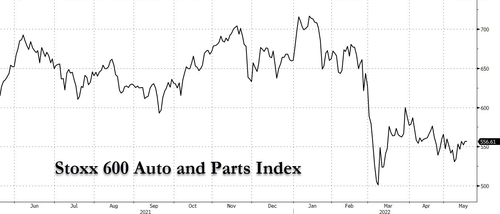
In an ominous sign for the auto industry overseas, new vehicle sales in Europe shrank by 20% - falling for the 10th month in a row - according to a Wednesday morning Bloomberg wrap up.
Registrations for April fell 20% to 830,447 vehicles, the report noted. The European Automobile Manufacturers’ Association noted that it was the steepest decline this year. Year to date, the Stoxx 600 Automobiles and Parts Index is down 16%.
Stellantis suffered the worst in April, with a 31% drop. Names like Mercedes-Benz Group, BMW, Volkswagen, Renault and Volvo will also be on watch heading into the back end of this week.
The cause of the slumping sales continues to be supply chain woes, though a strapped consumer in a rising rate environment may also likely contribute to tightening going forward.
The losing streak continues months after Goldman had opined that European automakers had already priced in a "stressed" scenario. The Stoxx 600 Auto and Parts Index was around the same level back in March and appears to be consolidating since then.
The bank had predicted that energy inflation wouldn't have a "material impact" on COGS and that impacts of energy prices were "low at this point". The bank still cut its EBIT estimates by 2%/4% and 14%/11% on average for 2022/23 for carmakers.
Despite cuts, the bank said back in March that auto names like BMW and Stellantis “do not look expensive even under our stress scenario”. In March, we also highlighted when Volkswagen's CEO said that the Ukrainian war could be worse for European autos than Covid was:
"The interruption to global supply chains could lead to huge price increases, scarcity of energy and inflation," Herbert Diess, chief executive of the German carmaker, told the Financial Times.
"It could be very risky for the European and German economies."
In an ominous sign for the auto industry overseas, new vehicle sales in Europe shrank by 20% – falling for the 10th month in a row – according to a Wednesday morning Bloomberg wrap up.
Registrations for April fell 20% to 830,447 vehicles, the report noted. The European Automobile Manufacturers’ Association noted that it was the steepest decline this year. Year to date, the Stoxx 600 Automobiles and Parts Index is down 16%.
Stellantis suffered the worst in April, with a 31% drop. Names like Mercedes-Benz Group, BMW, Volkswagen, Renault and Volvo will also be on watch heading into the back end of this week.
The cause of the slumping sales continues to be supply chain woes, though a strapped consumer in a rising rate environment may also likely contribute to tightening going forward.
The losing streak continues months after Goldman had opined that European automakers had already priced in a “stressed” scenario. The Stoxx 600 Auto and Parts Index was around the same level back in March and appears to be consolidating since then.
The bank had predicted that energy inflation wouldn’t have a “material impact” on COGS and that impacts of energy prices were “low at this point”. The bank still cut its EBIT estimates by 2%/4% and 14%/11% on average for 2022/23 for carmakers.
Despite cuts, the bank said back in March that auto names like BMW and Stellantis “do not look expensive even under our stress scenario”. In March, we also highlighted when Volkswagen’s CEO said that the Ukrainian war could be worse for European autos than Covid was:
“The interruption to global supply chains could lead to huge price increases, scarcity of energy and inflation,” Herbert Diess, chief executive of the German carmaker, told the Financial Times.
“It could be very risky for the European and German economies.”






